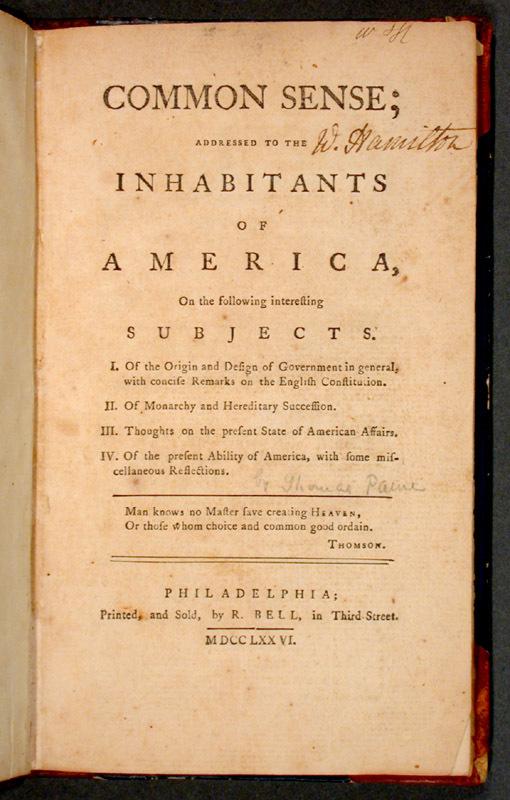
Thomas Paine, a fiery English-born political writer, is the answer to the question “Who Wrote Common Sense?”. Published anonymously in January 1776, this pamphlet became an immediate sensation, igniting revolutionary fervor across the thirteen colonies. Paine’s powerful prose and straightforward arguments resonated deeply with colonists from all walks of life, paving the way for the Declaration of Independence just six months later.
Table Content:
The Impact of Common Sense on the American Revolution
Common Sense wasn’t just another political treatise; it was a call to arms disguised as a pamphlet. Paine’s clear and concise writing style made complex political ideas accessible to the common person, a revolutionary act in itself. He argued for complete independence from British rule, a concept still debated among many colonists at the time. Paine skillfully dismantled the arguments for reconciliation, portraying the British monarchy as tyrannical and oppressive. He presented a vision of a free and independent America, governed by the people, for the people. This vision, fueled by Paine’s passionate prose, captured the hearts and minds of colonists and significantly shifted public opinion in favor of independence.
 Thomas Paine, Author of Common Sense
Thomas Paine, Author of Common Sense
Thomas Paine: From Obscurity to Revolutionary Icon
Before Common Sense, Thomas Paine was relatively unknown. He had arrived in America only a year earlier, carrying with him a letter of recommendation from Benjamin Franklin. This introduction opened doors for Paine, allowing him to contribute to the growing intellectual discourse surrounding colonial grievances. His experiences in England, including his dismissal from his job as an excise officer and his failed marriage, shaped his radical political views. Paine’s personal struggles fueled his empathy for the oppressed and his disdain for unjust governance, themes that resonate throughout Common Sense.
The Genius of Paine’s Prose
One of the keys to Common Sense’s success lay in its simple yet powerful language. Paine eschewed the convoluted and often inaccessible language of traditional political discourse, opting for a direct and conversational tone. This made his arguments easy to understand and relatable to a wider audience, including those who lacked formal education. He used vivid imagery and emotional appeals to connect with his readers on a visceral level, stirring their patriotism and fueling their desire for freedom.
 Common Sense Pamphlet and American Revolution
Common Sense Pamphlet and American Revolution
Beyond Independence: Paine’s Enduring Legacy
Thomas Paine’s contributions to the American Revolution extend beyond Common Sense. He continued to write and advocate for revolutionary ideals throughout the war, penning a series of pamphlets titled The American Crisis to bolster morale during difficult times. His writings inspired soldiers and civilians alike, reinforcing the importance of the fight for independence. While Paine’s later life was marked by controversy and periods of exile, his impact on the founding of the United States remains undeniable. He is remembered as a pivotal figure in the American Revolution, a voice for the voiceless, and a champion of liberty.
Exploring the Historical Context of Common Sense
To fully appreciate the significance of Common Sense, it’s crucial to understand the historical context in which it was written. The colonies were in a state of political turmoil, grappling with increasingly oppressive British policies. The Boston Tea Party, the Intolerable Acts, and the growing calls for resistance had set the stage for a potential revolution. However, the idea of complete independence was still a radical notion. Common Sense emerged at this critical juncture, providing a clear and compelling argument for breaking free from British rule. Paine’s pamphlet served as a catalyst, galvanizing public opinion and pushing the colonies closer to the brink of revolution.
 American Revolution Historical Context
American Revolution Historical Context
The Power of Words: How Common Sense Changed the World
Common Sense stands as a testament to the power of words to shape history. Paine’s simple yet powerful prose ignited a revolution, transforming the political landscape of the American colonies and inspiring generations to fight for freedom and self-determination. His unwavering belief in the inherent rights of man and his courageous advocacy for independence continue to resonate today, reminding us of the enduring power of ideas to change the world.
FAQ
When was Common Sense published? Common Sense was published in January 1776.
Why was Common Sense so influential? Its clear and accessible language made complex political ideas understandable to a wide audience.
What was Thomas Paine’s main argument in Common Sense? He argued for complete independence from British rule.
What other writings did Thomas Paine produce during the American Revolution? He wrote The American Crisis series of pamphlets.
How did Common Sense contribute to the Declaration of Independence? It shifted public opinion in favor of independence, paving the way for the Declaration.
What was Thomas Paine’s background before writing Common Sense? He was an English-born excise officer who had recently arrived in America.
Why did Thomas Paine write Common Sense anonymously? Expressing such radical views openly could have been dangerous at the time.